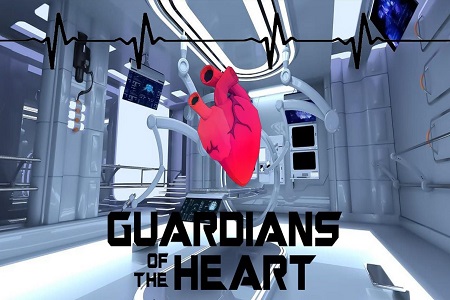
There are, of course, many diseases an individual can contract in the course of a lifetime. But often the one that provokes the most fear is heart disease. Perhaps that’s because, unlike the other long-term chronic maladies, heart disease has the potential to cause sudden death.
Yet, we find ourselves at a time in medical history when a heart patient in a life-threatening condition can be brought by ambulance to sophisticated medical facilities, like Hadassah Hospital Ein Kerem’s Irma and Paul Milstein Heart Center, and walk out the same day.
During “Guardians of the Heart,” a February 18 webinar hosted by Hadassah International, Prof. Offer Amir, director of the Milstein Heart Center, along with Prof. David Luria, head of its Medical Electrophysiology Unit, and Dr. David Planer, director of the Interventional Cardiology Department, described how new technology is already diminishing the power of heart disease to threaten our lives.
Though traditionally open-heart surgery was needed to treat complex cardiac problems, Prof. Amir explained that there has been a shift recently to minimally invasive procedures that resolve the problem in the catheterization laboratory. “One size fits all” treatments are being replaced with tailored solutions to a particular patient’s condition. Thanks to genetic mapping, genetic predispositions, and potential problems are being identified and addressed before they have a chance to create serious cardiac conditions.
Today, Prof. Amir noted, cardiac specialists can implant a heart pump that is small enough to be held in the palm of the hand. This pump keeps the heart pumping, even though the patient is in heart failure. The patient is able to resume a near-normal life, with the only limitations being no showers or swimming. Because of the minimally invasive nature of the procedure, very elderly and very sick heart patients are candidates for this life-saving treatment.
“In a decade or so,” Prof. Amir predicts, “heart transplantation will probably not be needed at all.” A life lived on a slew of anti-rejection medicines will be a thing of the past. Instead, he expects, 9 out of 10 patients with heart failure will have small pumps implanted, their hearts will recover, the pump will be taken out, and stem cells will be injected to rejuvenate the damaged heart.
Cutting-edge technology has also advanced the field of cardiac electrophysiology, Prof. David Luria noted. He explained that he and his team can now implant a small, slim cardiac monitor that will follow every beat of the patient’s heart and immediately detect irregular heartbeats (arrhythmias). A pacemaker or defibrillator is also implanted to restore proper rhythm to the heart and prevent cardiac arrest.
Prof. Luria was the first in Israel to perform an innovative procedure to treat an arrhythmia in a patient’s atrium by inserting a catheter through the thorax. The procedure enables the surgeon to access areas of the heart that were either difficult or impossible to reach previously and to destroy abnormal tissue with high-frequency electrical energy. In this way, the dysfunctional tissue becomes incapable of initiating the electrical signal that was causing the irregular heartbeat.
Also a cardiac pioneer, Dr. David Planer explained the minimally invasive procedure he helped develop to treat aneurysms within the patient’s aortic arch. Thanks to the ability to create a 3D model of the patient’s arch, cardiac interventionalists can rehearse the procedure before implantation of a new arch. Previously, he explained, the replacement required “the biggest surgery in medicine”—open-heart surgery, where the patient is frozen, the brain disconnected from the aortic arch, and the patient is placed on a heart/lung machine. The risky procedure could only be performed on young, healthier patients.
Before the pandemic, Dr. Planer has been traveling to various hospitals to teach his colleagues the procedure. Now he proctors remotely, enabling his colleagues to perform the aortic arch replacement with his help in real-time.
COVID-19 has been a major contributor to heart damage. As Prof. Amir explained, the virus causes an enormous amount of inflammation and clotting in the arteries of the heart, as well as pulmonary embolisms. Dr. Planer is a world pioneer in dissolving these life-threatening clots in the catheterization laboratory.
This year, Newsweek ranked Hadassah as one of the world’s best-specialized hospitals for cardiology. As Dr. Planer expressed during the webinar, “Once you have the technology, the sky is the limit.”
This webinar, moderated by HI Executive Director Jorge Diener and Gidon Melmed, director of Hadassah’s Development, Donors and Events Department, is episode 7 in HI’s Winter Live Series “50 Shades of Health: A Journey Into the Future of Medicine,” which provides a window into the latest advances in the frontiers of medicine, as practiced and envisioned by Hadassah’s visionaries.
Watch the webinar below:
